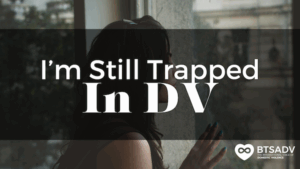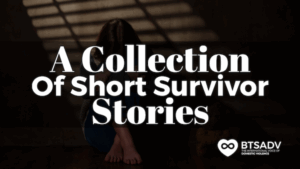By Kelly Stratton
DBT skills can help you cope with abuse after the fact.
Getting out of an abusive relationship is often seen as the finish line—but for many survivors, it’s just the beginning of the healing process. Long after the physical danger ends, the emotional wounds remain.
Living with Effects of Abuse
One of the most persistent and debilitating effects of abuse is anxiety.
For me, anxiety didn’t stop when the relationship did. In fact, it intensified. Why? Because now I had to rebuild my life while constantly managing the fear, hyper-vigilance, and doubt the abuse left behind.
When someone you once trusted uses control, manipulation, or violence against you, it shatters your sense of safety in the world. Even though I am in a loving environment now, I sometimes find myself scanning for danger, jumping at small noises, or struggling to breathe when something reminds me of the past.
These are trauma responses, aka automatic reactions from a nervous system that learned to expect harm.
Dialectical Behavior Therapy
What many people don’t understand is that survivors need tools—not just time—to heal. We can’t “just relax.” We can’t “just move on.” Our brains and bodies need rewiring, which is where skills-based therapies like Dialectical Behavior Therapy (DBT) come in.
DBT offers practical, structured techniques that help survivors regulate their emotions, tolerate distress and stay grounded during triggers. It’s one of the most effective approaches I’ve found in managing anxiety and rebuilding resilience.
Handling DBT Skills
Here are a few DBT skills that have helped me through:
Distress Tolerance:
When panic sets in or flashbacks hit, my instinct used to be to escape—mentally or physically. DBT taught me grounding tools like holding an ice cube, doing paced breathing, or using the
TIPP skill (Temperature, Intense exercise, Paced breathing, and Paired muscle relaxation) to bring my nervous system back down from a spike.
Emotion Regulation:
Abuse often leaves survivors feeling like they’re on an emotional rollercoaster. DBT helps you understand your emotions, identify their triggers, and build healthier responses. For example, checking in with myself daily about whether I’ve eaten, slept, or had any joy reminds me that I have power over some aspects of my emotional state.
Mindfulness:
I used to live in a constant state of fear—either replaying the past or bracing for the next disaster. Mindfulness helped me return to the present moment and retrain my brain to recognize when I’m actually safe.
One of the most effective tools for this is the 5 Senses Grounding Exercise: Name 5 things you can see, 4 things you can touch, 3 things you can hear, 2 things you can smell, and 1 thing you can taste. This simple but powerful technique pulls me out of spiraling thoughts and anchors me in the now, reminding me that I’m okay in this moment.
Interpersonal Effectiveness:
Abuse damages your ability to ask for what you need or set boundaries.
Skills like DEAR MAN (Describe, Express, Assert, Reinforce, Mindful, Appear confident, Negotiate) help you communicate clearly and advocate for yourself without fear or guilt.
DBT Skills and Living with Anxiety
Living with anxiety after abuse is a journey—but it’s one you don’t have to take alone or unarmed. Healing is not linear, and there are days I still struggle. But now, with DBT Skills I have tools to come back to center, even when the storm rolls in.
Survivors deserve more than survival—we deserve peace, power, and the skills to protect both.
Check These Resources:
- Therapeutic Interventions for Healing From Domestic Violence
- The Hidden Impact of Teen Dating Violence
- Find Support with BTSADV
Support Line
Other Resources and Information:



